Chasing Eclipses with timeanddate
timeanddate.com captures breathtaking live images of solar and lunar eclipses worldwide using a mobile observatory.
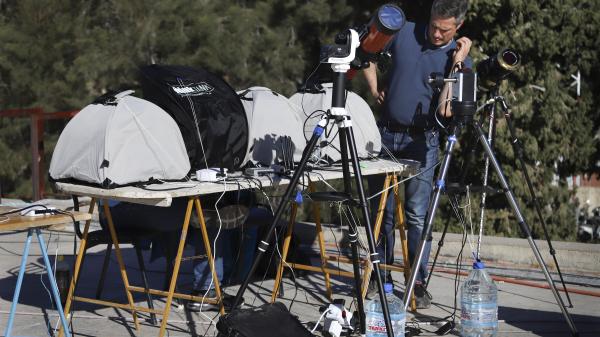
Adalbert Michelic setting up the telescopes of the mobile observatory in San José de Jáchal, Argentina.
©timeanddate.com
We kick off this year with a total solar eclipse across North America on April 8, 2024.
We’re dispatching two teams to the US: one to Texas and another—highly mobile—team to the American Northeast just to make sure we capture the whole eclipse.
A Traveling Telescope
Although the setup of a mobile observatory is a lot simpler than one might think, there is quite an extensive list of items needed to make sure the images make it all the way to our viewers around the world, including:
- a telescope or two,
- a camera to capture the telescope images,
- a couple of computers with the right software,
- networking equipment,
- a good internet connection,
- a huge number of cables and batteries, and,
- astronomy enthusiasts willing to travel across oceans.
Solar and lunar eclipses worldwide
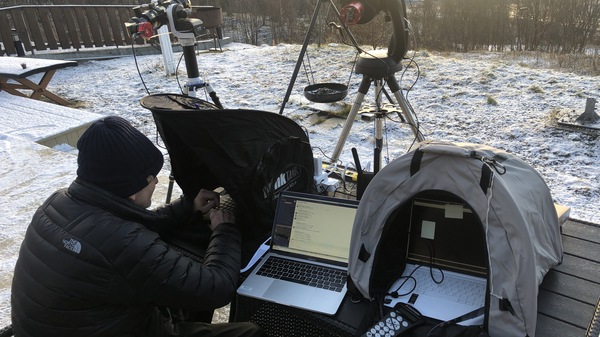
Steffen Thorsen and our mobile observatory streaming a partial solar eclipse from the northern tip of Norway.
Chasing Eclipses Since 2016
Each eclipse can only be seen from certain locations, so filming them can mean just setting up our telescopes on the roof of our headquarters in Norway, a short road trip to chase a patch of blue sky—or traveling to the other side of the globe. Past trips include:
2023: Western Australia, New Mexico, Western Norway
In April 2023, we dispatched our mobile observatory to Exmouth, Western Australia, to cover the total solar eclipse. See totality on our YouTube channel (and remember to subscribe).
Our team returned to Roswell, New Mexico, for the annular solar eclipse in October, but looming clouds meant our teams split up at the last minute. Three of us stayed in Roswell, and two drove across the border to Odessa, Texas, and caught these beautiful images of annularity.
Our last mobile observatory dispatch was to Bergen, the rain capital of Norway, to stream the partial lunar eclipse at the end of October. We also got a little bonus: Jupiter made a guest appearance at the end of our livestream. Geremy Krause testing one of our telescopes before the 2023 annular solar eclipse in Roswell, New Mexico. ©timeanddate.com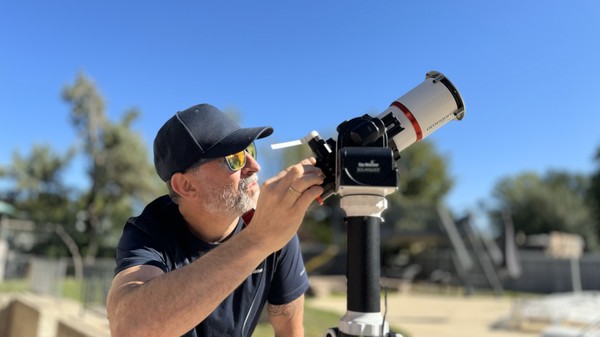
2022: Morocco, Northern Norway, New Mexico
In May 2022, our mobile observatory was finally on the road again after a long travel hiatus. This time, we went back to Ouarzazate, Morocco, to live stream the total lunar eclipse.
For the partial solar eclipse in October, we dispatched our mobile observatory to the northern edge of Norway. Two weeks later, our team flew to Roswell, New Mexico, to cover the November lunar eclipse—although we ended up in Tucson, Arizona, due to bad weather in Roswell.
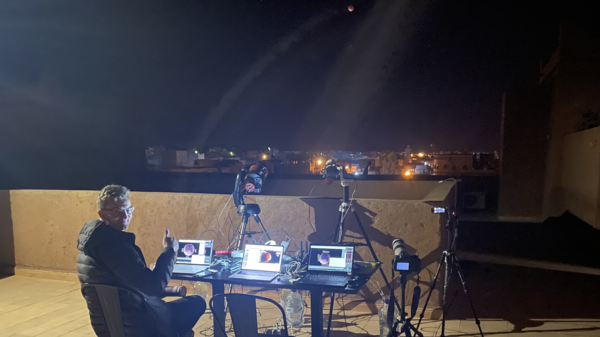
Mathew Gundersen watching a total lunar eclipse (the red dot at the top of the image), and making sure it gets streamed to our studio in Stavanger, Norway.
©timeanddate.com
Lunar Eclipse in November 2021
We streamed the almost total lunar eclipse on November 18–19, 2021. Covid restrictions kept us from traveling to North America with our mobile observatory, but with the help of our stellar (or lunar, you might say) streaming partners, we still streamed it LIVE.
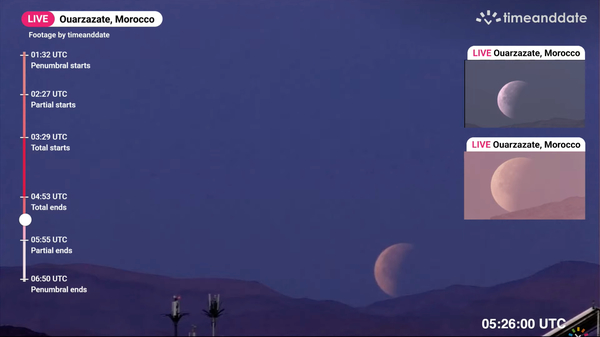
An eclipsed Moon sets over the Sahara desert in May 2022—captured by the timeanddate mobile observatory.
©timeanddate
Lunar and Solar Eclipses in May and June 2021
Covid restrictions kept our mobile observatories within Norway’s borders for the annular solar eclipse on June 10, 2021. After monitoring the weather and deciding at the last minute where to travel, we ended up with one observatory going to Kautokeino and one to Oslo. See the eclipsed Sun in our annular solar eclipse show.
Unfortunately, the pandemic completely blocked our plans to take the mobile observatory on the road for the total lunar eclipse on May 26. Luckily, with the help of our trusty streaming partners, we streamed the eclipse LIVE. See the Blood Moon in the total lunar eclipse show.
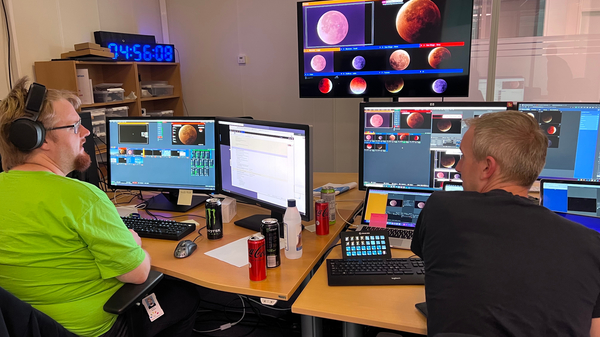
Images from our partners across the globe coming into the timeanddate HQ during an eclipse live stream.
©timeanddate
Eclipses in November and December 2020
Covid-19 travel restrictions stopped our plan to take the mobile observatory to Argentina for the total solar eclipse on December 14, 2020. We still streamed the total solar eclipse with our streaming partners’ help.
As a special bonus show, we also live-streamed the penumbral lunar eclipse on November 29/30, 2020.
Annular Solar Eclipse 2020
Our plans to travel to Oman to capture the annular solar eclipse on June 21 were thwarted by Covid-19 travel restrictions. Despite this, several partners on location helped us broadcast a spectacular live stream of the eclipse straight from our studio in Stavanger, Norway.
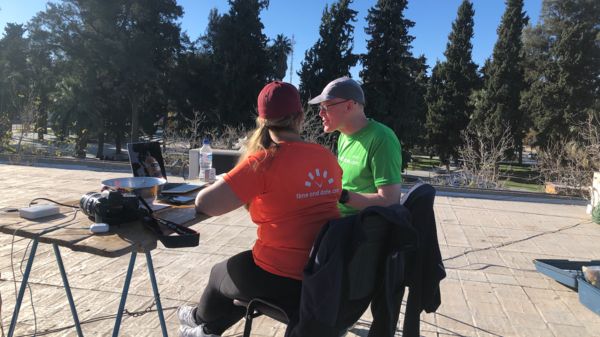
Anne Buckle and Graham Jones hosting the July 2, 2019 total solar eclipse live show from Argentina.
©timeanddate.com
Three Eclipses and a Transit in 2019
In 2019, timeanddate’s mobile observatory was on the road for a transit of Mercury, a partial lunar eclipse, a total solar eclipse, and a total lunar eclipse.
- On November 11, 2019, we traveled to Ålesund, Norway, to capture Mercury moving across the Sun.
- During the night between July 16 and 17, 2019, we streamed the partial lunar eclipse from Šibenik, Croatia.
- A few weeks before that, we went to San José de Jáchal, Argentina, to capture the July 2, 2019 total solar eclipse.
- In January 2019, we traveled to Ouarzazate, Morocco, for the January 20 / 21, 2019 total lunar eclipse.
Lunar Eclipse in Greece 2018
We first took the mobile observatory on the road in 2018, capturing the July 27, 2018 total lunar eclipse from Santorini, Greece.
Bonus Track: Mercury Transit in 2016
For our very first live stream—the transit of Mercury in 2016—we simply put an amateur telescope on the balcony outside our offices.
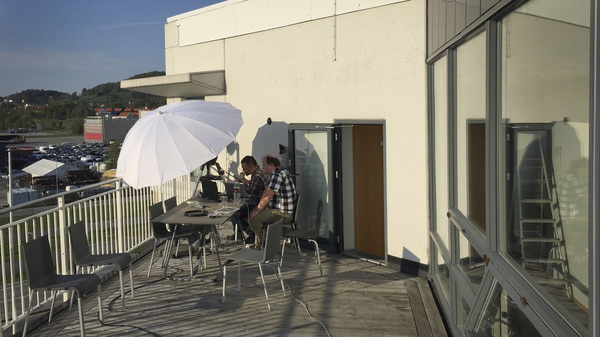
Our first ever live stream was on the balcony of timeanddate’s old offices with this simple setup. The wooden floorboards posed a problem when zooming in on tiny Mercury moving across the Sun’s surface!
©timeanddate.com